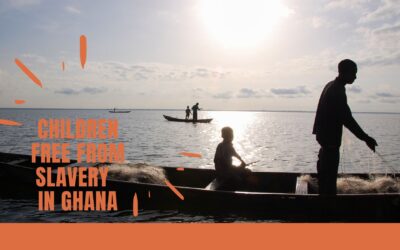The Village of Life shelter is exactly what modern slavery survivors need. It’s a vibrant and supportive place – far from the hardships and exploitation that children experience when enslaved in remote fishing villages along Lake Volta in Ghana.
My visit to this FTS-supported shelter started with a simple tour, including dormitories for boys and girls, the sick bay, canteen, school, soccer pitch, basketball court and play fields. There’s everything a child needs to become a child once again.
But just as important as the physical infrastructure is the philosophy of caring that is so evident here. Children arrive as malnourished, overworked laborers who have endured deeply traumatizing conditions in dangerous fishing canoes. The shelter staff understands that these children need physical, psychological, social and educational support to fully recover and return home.
One of the highlights of my visit to Ghana earlier this summer was my meeting with two child slavery survivors who are rebuilding their lives at the Village of Life.
Maabena is a 14-year-old girl who was rescued by PACODEP, our implementing partner in the Oti region. She explained that the government directive to curb COVID-19 caused the closure of schools, and this led to her staying at home and becoming a burden for her parents. Her father and mother, out of financial constraints, gave her hand in marriage to a man who was interested in her. This man paid a paltry sum of GHC 100 ($17 USD) and a bottle of schnapps as a bride price. A journalist trained by the FTS Ghana team about child trafficking and forced marriage received a tip off and Maabena was ultimately rescued. She told me how happy she is to be free, and how sad she was that her education was cut short by forced marriage.
Sabutey is a 17-year-old boy who was part of a rescue carried out by PACODEP after a tip that 15 children had been trafficked to a community called Olumankope. He left home in search of greener pastures after the divorce of his parents. He was initially assisted by a man who said he’d find work for him, but Sabutey was handed over to another man. The agreement was Sabuty would receive one cow and an undisclosed amount of money if he worked for the new master for four years. Fortunately, he was rescued after three months and brought to the shelter.
There are thousands of children like Maabena and Sabutey who’ve been robbed of their rights. The FTS Growing up Free program is rebuilding their futures, restoring hope to children whose lives have been interrupted by trafficking.
Editor’s note: This is the second of four posts this month from FTS Executive Director Bukeni Waruzi about his visit this summer to the front lines of modern slavery in Ghana. See all his Ghana posts and learn more about our Growing up Free program on our Ghana webpage.

